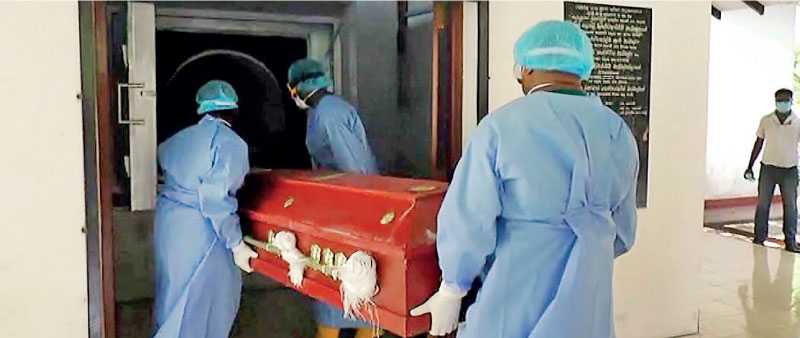Sunday Feb 22, 2026
Sunday Feb 22, 2026
Monday, 1 February 2021 00:00 - - {{hitsCtrl.values.hits}}

Rights activists and victims are hoping the High Commissioner for Human Rights Michelle Bachelet will raise the Government’s mandatory cremations policy for all corona virus-related deaths during her oral submission on 24 February, after the issue was highlighted in her report on Sri Lanka released last Wednesday.
Human Rights Activist Shreen Saroor hailed Bachelet’s report saying it had provided “oxygen” for activists and victims to continue their struggle for truth and justice.
Calls are mounting internationally for the Government to allow Muslims to bury their dead, even when they succumb to the deadly virus consuming the world. Sri Lanka is the only country of 200 nations and territories that mandating cremation for victims of COVID-19, and Sri Lankan Muslim politicians and activists have criticised the policy as discriminatory.
The US State Department has weighed in on the issue, and last week US Senator for the State of Maryland Christopher Van Hollen wrote to Sri Lankan Ambassador to the US Ravinatha Aryasinha urging the Government to permit all citizens to choose how they may safely and honourably lay their loved ones to rest. “As the act of cremating a dead body is forbidden in Islam, this policy has exacerbated the stress and grief in the Muslim community in Sri Lanka,” Senator Van Hollen said in his letter.
Bachelet’s 27 January report to the UN Human Rights Council’s 46th Session made specific reference to how the COVID-19 pandemic had impacted religious freedom and exacerbated discrimination and marginalisation suffered by the Muslim community.
Families who have been victimised by the Government’s policy told Daily FT that they were pleased the issue had been raised by the UN High Commissioner for Human Rights after their petitions to the Supreme Court challenging mandatory cremations was thrown out.
“At least this Government is being held to account by someone. I have gone to the Supreme Court and my case was dismissed,” said Mohamed Nowsar, whose father was cremated by State authorities without the consent of his family.
Salman, the son of Renoza, who was cremated by the authorities though her PCR test subsequently came back negative, reacted to High Commissioner Bachelet’s report, saying he was glad the UN was taking up the issues of Muslims, particularly the problem of their loved ones being cremated. “I hope they ask the Government to cancel this cremation only policy – it is so hurtful to us and it goes against our religion and customs,” he added.
Saroor told Daily FT that she and other activists had been hoping the report would have laid more emphasis on the ongoing attacks against Sri Lanka’s religious minorities. “There is a specific paragraph in High Commissioner Bachelet’s report referring to COVID-19 related discrimination against Muslims, but it does not contain a specific recommendation to the Government about this issue,” Saroor said in an interview after the release of the report, which was a stinging rebuke of Sri Lanka’s current human rights situation.
“We were hoping High Commissioner Bachelet would have requested the Government to treat minority religious communities equally, and as a measure of goodwill to minorities, to revise the Extraordinary Gazette that mandated cremation as the only way to dispose of those who die from the coronavirus,” Saroor added.
“We hope this will be fixed in her oral submission,” the human rights activist said.